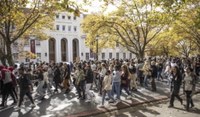
It’s not racist until it’s racist
There is something surreal about the high pitched denunciation of apparent racism that percolates in our public space.
The response to the alleged racist urinating incident at Stellenbosch University was loud, outraged, sometimes racist. It was a disgusting act, but the fact that the victim was black doesn’t mean that it was racist.
This juvenile behaviour, unfortunately, is not uncommon at universities, even the Ivy League institutions. My colleague exposed us to this world here.
The commentariat, usually comprised of the privileged elite which includes university students, go out into the public square, spewing outrage. The outrage festers because social media is suited to charges of outrage and intolerance.
The urinating incident was revolting. The perpetrator deserves any punishment the university may impose on him. What I don’t know is, and I don’t know if the commentariat knows, was the incident racist?
The commentariat holds that the fact that it happened to a black student, ipso facto, made it racist. If there was no intention to be racist and the student could as easily have done it to a white student, it’s not racist.
What is particularly egregious is that one prank by a student, most likely drunk out of his skull, reflects ‘institutional’ or ‘systemic’ racism.
Prof. Jonathan Jansen, Professor of Education at the University of Stellenbosch, questioned why we are rightly outraged over the ‘pissing incident’ but asks where is the outrage over the 2,818 children under the age of five who have died of malnutrition in SA hospitals in the past three years? ‘Where is the campus outrage at a time when we literally put flames to the bodies of black people from other African countries? There is something deeply disturbing about student activism at present. It is so inwardly focused, transient and blissfully disconnected from the broader politics of racial resentment in the country and the world. In other words, a poverty of thinking that results from a narrow education that has little in its knapsack other than reactionary behaviour.’
James Myburgh in an article on Politicsweb entitled ‘The Two Weeks Hate and Tony Leon’ describes it thus: ‘In South Africa there is a ritual, best described as the Two Weeks Hate*, in which some person or institution becomes the focus of intense uncontrollable rage, first on Twitter, and then across the local and sometimes even international media. This developed into its current form about five years ago and the general pattern, and the High Priests responsible for its execution, are all familiar by now.’
The upshot is that the go-to position (even for Prof.Jansen), when the act of a white person has been publicly declared racist before evidence finds the alleged perpetrator to be (or not) a racist, puts the finding ahead of an examination of the facts. As a consequence, innocent lives that may be damaged, students leave their universities and jobs may be lost.
The South African Human Rights Commission has found after investigation that many cases of alleged racism, reveal that the accused have not committed racist acts. But the damage has already been done.
Prof. Jansen says ‘Now that some of the smoke of protest has cleared around an outrageously racist act in a men’s residence at Stellenbosch University (SU), it is time for deeper reflection. The facts of the case are undisputed. A white student urinated on the laptop and other possessions of a black student. However, the public incense, sometimes disguised as commentary, was all over the place. Let’s take a closer look.’
He then goes on to say that this incident is a distraction from bigger issues . On process he says ‘even a simple decision by the senate to teach a core module that requires all students to engage with issues of race, identity, culture and politics has remained in a cycle of perpetual piloting status.’
I am not convinced about “teaching” students not to be racist will resolve the problem. Prof. Jansen is correct, however, when he says racist attitudes will mostly come from a home environment. The home environment is not in the purview of the accusers or the university. For that reason it may be very difficult to change the attitudes of studdents.
In reality we will never rid society of racism. In the same way that we won’t rid society of gender-based violence, rape and murder. The best we can hope for is to lessen it or minimise it.
Attitudes are very difficult to change. What schools and universities can achieve, however, is the inculcation of behaviour that is moderate and respectful whatever a student’s beliefs are. But don’t expect to change attitudes. Attitudes change with time and exposure to different environments and different people, and because of the inculcation of good behaviour.
Many of the cases of alleged racism investigated by the South African Human rights Council find that the alleged perpetrators have not committed racist acts. But the damage has already been done.
An article in The Citizen was headed ‘Racism remains SA’s most stubborn problem, as SAHRC sees spike in complaints’. Racism is an issue in this country, but is not by any stretch South Africa’s most stubborn problem. The hysterical hyperbole of the press doesn’t help.


